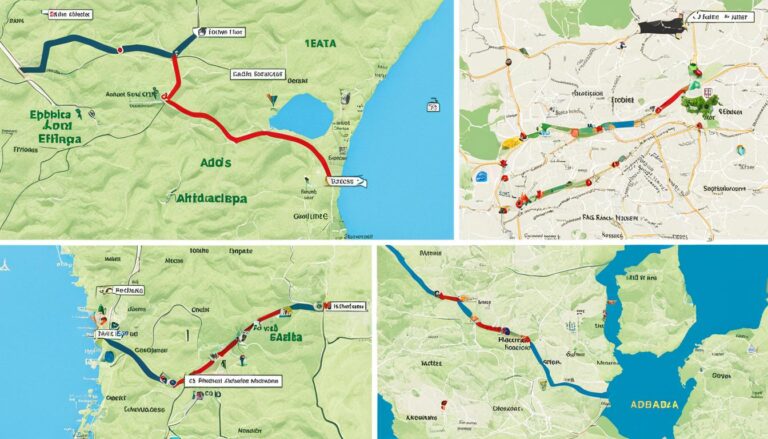How Did Ethiopia Resist Imperialism?
Did you know that Ethiopia was the only independent nation in Africa, apart from Liberia, during the height of European imperialism? This remarkable fact highlights Ethiopia’s remarkable resistance against colonial powers and its tireless efforts to preserve its sovereignty. In this article, we will explore how Ethiopia’s anti-colonial movements and strategic leadership contributed to its successful fight against imperialism, with a particular focus on the pivotal Battle of Adwa in 1896.
Key Takeaways:
- Ethiopia was the only independent nation in Africa, apart from Liberia, during the height of European imperialism.
- The Battle of Adwa in 1896 was a significant event in Ethiopia’s resistance against colonialism.
- Emperor Menelik II played a crucial role in leading Ethiopia’s fight against Italian encroachments.
- The victory at the Battle of Adwa shattered the stereotype of African inferiority and inspired anti-colonial movements across Africa.
- Ethiopia’s strategic resistance and sovereignty preservation serve as an important lesson in preserving independence and unity.
The Battle of Adwa: Turning the Tide against European Attitudes
The Battle of Adwa, fought in 1896 between Ethiopian forces led by Emperor Menelik II and Italian invaders, had a profound impact on European attitudes towards Africans during the Age of Imperialism. It was a significant event in Ethiopia’s historical anti-colonial struggle and resistance against imperialism.
The victory at Adwa shattered the stereotype of African inferiority and challenged Italy’s imperialist ambitions in the region. This battle marked a turning point in Ethiopia’s fight against imperialism and inspired other anti-colonial movements across Africa.
“The Battle of Adwa demonstrated the strength and resilience of Ethiopia in the face of European aggression. It showcased the innate value and capabilities of African nations, dispelling the myth of inferiority perpetuated by European colonial powers.”
The Legacy of Adwa
The Battle of Adwa left an indelible mark on the collective memory of Africans and African-Americans, providing inspiration for future resistance movements against colonial powers. It symbolized Ethiopia’s unwavering determination to preserve its sovereignty and served as a beacon of hope for other nations facing imperialist aggression.
“Adwa represents the power of unity and the triumph of the oppressed. It stands as a testament to the resilience and strength of African people in the face of adversity.”
The victory at Adwa debunked the notion of African inferiority propagated by European powers and reaffirmed the importance of African resistance in the fight against colonialism. It inspired pan-African visionaries and intellectuals, such as W.E.B. DuBois, who saw in Adwa a symbol of African agency and resistance.
Adwa’s Historical Significance
The Battle of Adwa not only thwarted Italy’s imperialist ambitions but also challenged the dominant narrative of European superiority over African nations. It shattered preconceived notions, demonstrating that African forces were capable of successfully repelling European invaders.
| Historical Significance of the Battle of Adwa | Impact on European Attitudes |
|---|---|
| Defiance of European attempts to colonize Africa | Challenged perceptions of African inferiority |
| Inspired other African nations in their fight against imperialism | Undermined Italy’s credibility as a colonial power |
| Highlighted the importance of unity and strategic leadership in resistance | Provoked self-reflection and re-evaluation of colonial policies |
“The victory of Adwa was a turning point not only for Ethiopia but also for the broader anti-colonial movement in Africa. It challenged the prevailing narrative of European dominance and sparked a renewed sense of African agency and pride.”
Stay tuned for the next section as we explore the impact of Ethiopian independence on the fractured nature of Italian imperialism.
Ethiopian Independence and the Fractured Nature of Italian Imperialism

Italy’s imperialist ambitions in Ethiopia were met with resistance not only from Emperor Menelik II but also from the fractured nature of Italian imperialism itself. The Italian statesman Marquis d’Azeglio commented that “We have made Italy. Now we must make Italians,” reflecting the division and apathy within Italian society. The concern for cost and the strong anti-colonial movement in Italy influenced the actions of the Italian government and ultimately led to their defeat at the Battle of Adwa.
Ethiopia’s strategic resistance and sovereignty preservation were crucial in countering Italian imperialism. Emperor Menelik II’s leadership and the unity of the Ethiopian people played a significant role in defending their independence. The resistance strategies employed by Ethiopia included proactive measures such as military training and the acquisition of advanced weaponry. These efforts ensured Ethiopia’s ability to withstand the Italian invasion and preserve their sovereignty.
“We have made Italy. Now we must make Italians.” – Marquis d’Azeglio
The fractured nature of Italian imperialism and the internal division within Italy itself weakened their ability to conquer and colonize Ethiopia. The concerns over the cost of war and the strong anti-colonial sentiment in Italy hindered their imperial ambitions. In contrast, Ethiopia’s strategic leadership and unified resistance proved vital in defending their homeland. The Battle of Adwa stands as a testament to Ethiopia’s successful struggle against imperialism and the preservation of their sovereignty.
| Italy’s Imperialist Ambitions | Ethiopia’s Resistance |
|---|---|
| Driven by the desire for territorial expansion and resources | Guided by the determination to defend independence and sovereignty |
| Fractured and divided due to internal politics and lack of unified purpose | United under the leadership of Emperor Menelik II |
| Overestimated their military strength | Invested in military training and modern weaponry |
| Weak public support and anti-colonial sentiment within Italy | Strong national unity and resistance against imperialism |
| Defeat at the Battle of Adwa signified the failure of Italian imperialism in Ethiopia | The victory at Adwa solidified Ethiopia’s independence and preserved their sovereignty |
Emperor Menelik II: A Complex Historical Figure and Crafty Politician

Emperor Menelik II was a remarkable leader who played a pivotal role in Ethiopia’s fight against colonialism and resistance against imperialism. His strategic acumen and political craftiness were instrumental in navigating the challenges posed by Italian imperialism.
“We have to use our cunning and wit to outmaneuver the Italians and secure our sovereignty,”
Menelik II employed various strategies to solidify his position as Emperor and safeguard Ethiopia’s independence. One notable example was his astute use of political maneuvers, leveraging the Italians as a means to crush a rival claimant to his throne. This calculated move demonstrated his shrewd approach to maintaining his power and protecting the interests of his nation.
In addition to his political prowess, Menelik II showcased foresight by importing European weapons and bolstering Ethiopia’s military capabilities. These measures not only strengthened their resistance against colonial forces but also sent a clear message that Ethiopia was a force to be reckoned with.
Menelik II’s leadership and strategic decision-making were pivotal in Ethiopia’s fight against colonialism. His ability to navigate the complex landscape of imperialism helped Ethiopia preserve its sovereignty and maintain its independence.
The Legacy of Emperor Menelik II
Inspired by Menelik II’s resistance strategies, future generations of Ethiopians continued the fight against colonialism. His legacy served as a catalyst for the development of ongoing resistance movements, further empowering Ethiopia and contributing to the broader struggle against imperialism in Africa.
| Ethiopian Resistance Strategies | Effects |
|---|---|
| Importing European weapons | Strengthened defense capabilities and showcased Ethiopian military prowess |
| Political maneuvering | Solidified Menelik II’s position as Emperor and prevented internal power struggles |
| Strategic decision-making | Preserved Ethiopia’s sovereignty and independence |
Emperor Menelik II’s contributions and strategic leadership continue to inspire the fight against colonialism and imperialism. His complex legacy serves as a testament to the resilience and determination of the Ethiopian people in their ongoing struggle for freedom and sovereignty.
The Symbolism of Adwa: African and African-American Resistance
The Battle of Adwa holds immense symbolism, representing a powerful testament to African and African-American resistance against colonialism. While Emperor Menelik II did not explicitly embrace this symbolism, the victory at Adwa inspired pan-African visionaries who saw it as a beacon of hope in the fight against Italian invaders. Notably, Benito Sylvain of Haiti found a kindred spirit in Menelik’s resistance, and the battle’s symbolism resonated with the global African diaspora.
W.E.B. DuBois, a prominent African-American scholar, recognized the significance of Adwa and its connection to the African struggle against colonial powers. He saw it as a pivotal moment that affirmed the importance and resilience of African resistance movements. Adwa represented a profound symbol of empowerment and defiance, inspiring African and African-American communities to confront and challenge colonial oppression.
“The Battle of Adwa was fought for the preservation of human rights and civil justice. It became for the Negro and colored peoples everywhere an immortal example of successful warfare against attempts at mental, physical, and spiritual subjugation. It can never cease to be the watchword of all the free spirits that love the human race.”
Adwa’s Influence on African Liberation Movements
The Battle of Adwa reverberated far beyond Ethiopia’s borders, leaving an indelible mark on African liberation movements. The symbolism of Adwa as a triumphant moment of resistance resonated with Africans striving for freedom from colonial powers. The battle served as a rallying cry, inspiring future generations to rise against oppressors and fight for independence.
Adwa’s impact was felt in other African territories under colonial rule, igniting a spirit of unity and defiance. It awakened a sense of possibility and revealed to Africans their inherent strength to challenge and dismantle oppressive systems. The legacy of Adwa fueled the flames of liberation movements across the continent, laying the foundation for the eventual demise of colonialism in Africa.
| Key Figures | Key Concepts and Movements |
|---|---|
| W.E.B. DuBois | Pan-Africanism |
| Benito Sylvain | Black internationalism |
| Emperor Menelik II | African nationalism |
| Adwa victory | Resurgence of African pride |
Ethiopia’s Impact on Anti-Colonial Efforts
The Battle of Adwa and Ethiopia’s successful resistance against Italian imperialism left a profound mark on anti-colonial movements. The strategic lessons learned from Ethiopia’s resistance strategies served as a model for future efforts against imperialism. One important method was the effective use of the press to garner public sympathy and support. Ethiopian resistance fighters utilized newspapers and pamphlets to spread their message, highlighting the injustice of colonial rule and inspiring others to join the fight.
Ethiopia’s victory at Adwa not only showcased the possibility of challenging European domination in Africa but also ignited a ripple effect throughout the continent. The triumph at Adwa served as a symbol of hope and resilience, inspiring other African nations to resist colonial powers. The battle displayed the strength and determination of Ethiopian forces, proving that imperialism was not invincible and could be overcome through unity and strategic resistance.
“The Battle of Adwa was a pivotal moment in the fight against colonialism. It demonstrated the power of a united front and showed that African nations were fully capable of asserting their independence.”
Despite its historical significance, Adwa’s impact on European self-assurance quickly faded, with colonial powers conveniently forgetting the defeat. Nevertheless, the seeds of resistance that were sown during that time continued to inspire generations of anti-colonial fighters.
| Impact of Ethiopian Resistance Strategies | Examples |
|---|---|
| Empowerment of African Nations | Adwa’s victory inspired other African countries to fight against colonial rule, leading to the growth of anti-imperialist movements across the continent. |
| Rejection of Western Dominance | Adwa shattered the belief in European superiority and challenged the narrative of African inferiority, leaving a lasting mark on the collective consciousness. |
| Strategic Anti-Colonial Efforts | Ethiopia’s resistance strategies, such as leveraging the press and adopting advanced weaponry, became a blueprint for future anti-colonial movements. |
| Symbol of African Unity | Adwa’s symbolism as a symbol of resistance and African unity resonated with pan-African visionaries and inspired a sense of solidarity across the continent. |
Ethiopia’s fight against colonialism serves as a powerful testament to the strength and resilience of a nation determined to preserve its sovereignty. The impact of Ethiopia’s resistance strategies and the historic Battle of Adwa cannot be overstated, as they continue to inspire and shape anti-colonial efforts around the world.
Ethiopia’s Strategic Leadership and Sovereignty Preservation
Ethiopia’s resistance against imperialism was characterized by strategic leadership and the preservation of its sovereignty. Emperor Menelik II’s proactive measures, such as integrating advanced weaponry and conducting comprehensive military training, bolstered Ethiopia’s defense capabilities.
Menelik’s political acumen and ability to navigate complex alliances further strengthened Ethiopia’s fight against colonialism. By forming strategic partnerships with other African nations and utilizing diplomatic tactics, Ethiopia successfully resisted the encroachment of imperial powers.
One example of Menelik’s strategic leadership is displayed in his negotiation of the Treaty of Wichale with Italy. By carefully examining the fine print, Menelik ensured that the terms of the treaty favored Ethiopian interests and autonomy, setting the stage for future conflicts and ultimately the Battle of Adwa.
“We must take decisive action to preserve our nation’s independence and sovereignty,” declared Emperor Menelik II. “Our unity and strategic cunning will be key in our resistance against imperial powers.”
Additionally, Ethiopia’s resistance efforts were rooted in national unity and proactive measures. Menelik focused on building a strong sense of national identity and fostering unity among diverse ethnic groups within Ethiopia. This unified front played a crucial role in preserving Ethiopia’s independence and sovereignty.
| Key Elements of Ethiopia’s Strategic Resistance | Benefits |
|---|---|
| Integration of advanced weaponry | Enhanced defense capabilities and deterrence against imperial powers |
| Comprehensive military training | Increased readiness and effectiveness of Ethiopian forces |
| Negotiation of favorable treaties | Protection of Ethiopian interests and preservation of sovereignty |
| Fostering national unity | Stronger resistance against imperialism through collective strength |
Ethiopia’s strategic resistance, marked by Menelik’s leadership and the nation’s unity, set an inspiring example for other African countries facing similar challenges. The preservation of Ethiopia’s sovereignty and independence serves as a testament to the power of strategic leadership and proactive measures in the face of imperialist aggression.
Conclusion
Ethiopia’s struggle against imperialism and its fight against colonialism exemplify the power of strategic leadership, national unity, and proactive measures. Under the guidance of Emperor Menelik II, Ethiopia successfully resisted Italian encroachments and preserved its sovereignty. The Battle of Adwa, a turning point in Ethiopia’s anti-colonial efforts, shattered the stereotype of African inferiority and inspired other resistance movements across Africa.
The legacy of Ethiopia’s fight against colonialism extends beyond its borders, serving as a symbol of African and African-American resistance against colonial powers. The Battle of Adwa sparked hope and inspired pan-African visionaries like Benito Sylvain and W.E.B. DuBois, resonating with the global African diaspora. Moreover, Ethiopia’s strategic resistance continues to remind us of the crucial role played by national unity and proactive measures in preserving independence and sovereignty.
As we reflect on Ethiopia’s anti-colonial efforts, it is evident that the country’s successful resistance against imperialism was anchored in Emperor Menelik II’s leadership and political prowess. His strategic acumen, along with the adoption of advanced weaponry and comprehensive military training, bolstered Ethiopia’s defense capabilities. Ethiopia’s fight against colonialism serves as a testament to the importance of strategic leadership and proactive measures in the face of external aggression.
In conclusion, Ethiopia’s struggle against imperialism and its anti-colonial efforts have left an indelible mark on history. The Battle of Adwa, a symbol of African and African-American resistance, continues to inspire generations. Let us remember the significance of Ethiopia’s fight against colonialism and strive to preserve the ideals of independence and sovereignty for future generations.







